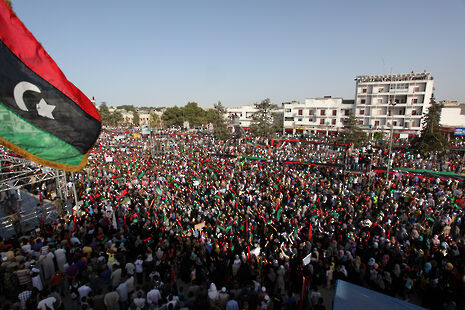Why the shadow of Libya looms large over Europe
In his first column, Naman Habtom-Desta examines the impact of European intervention in Libya, and why it matters

When seen from Britain, Libya appears less as a neighbour and more as a faraway sandbox separated from this island by two bodies of water and a continental mainland. However, from the beaches of Sicily, it appears as a forsaken land plagued by destruction and mayhem with no hopeful, imminent prospects. While Syria is where our attention is turned to with regards to power politics, jihadism, and migration, Libya will potentially have a greater long term impact on Europe, a possibility that is more obscure from this side of the channel.
Libya’s long term legacy will be the presence of military intervention in Europe’s foreign policy. The Security Council resolution that allowed for the implementation of a no-fly zone in 2011 was a rare moment in international relations where the major world powers reached a consensus. This could have formed the basis for future cooperation and trust between the European Union on the one hand and Russia and China on the other. However, instead of harmonious collaboration, distrust emerged as France and the UK, with American support, seemed to move from enforcing a no-fly zone to demanding regime change, an allegation not wholly refuted. When asked if NATO violated the Security Council resolution by going to Tripoli, the former French foreign minister Bernard Kouchner responded “[t]hat’s not completely untrue”.
“The problem lies not only in the intervention itself but what it is now understood as”
The problem lies not merely in the intervention itself but what it it is now understood as. According to General Michael Hayden, a former CIA director, possession of a nuclear weapon has become a rational objective for North Korea. This comes in light of the demise of Colonel Gaddafi, after the latter disbanded his WMD programme. But nuclear proliferation in northeast Asia is not the only lasting consequence of our reckless conduct; look, for example, at Russian obstructionism towards UN involvement in Syria, and the establishment of a no-fly zone. Thus, the inability to foster a relationship based on trust has resulted in another source of external pressure on Europe. Fortunately, there has been some recognition of this fact. This October, at a joint press conference featuring the Egyptian and French presidents (which was preceded by a meeting on Libya), Macron moved away from the interventionist tradition when he said “just as I don’t accept being lectured on how to govern my country, I don’t lecture others.”
The most obvious issue caused by intervention is migration. As a result of the 2016 EU-Turkey refugee deal, the Balkan route fell out of favour among migrants, resulting in the Mediterranean route becoming more popular. Though irregular migration has decreased, that’s not how it seems in southern Italy. While British media may not emphasise the Libyan component, the people in the south of Europe certainly do. In 2016, I wandered the streets of the Roman-Byzantine city of Ravenna, renowned for its historic churches, where sub-Saharan migrants sat aimlessly in the city centre. Though my grandmother, a native Italian speaker, had herself once fled a war-torn sub-Saharan country – replete with the classic tropes of a military junta, rebels, separatists, and famine – she nonetheless remarked with frustration and mild coarseness at the migrant situation.
What will this mean when Italians vote in March? With Italy soon to form its 66th government in 72 years, this founding state of the European Union risks destabilising the pillars that have been foundational in the post-war European order. With Austria considering deploying troops to the Italian border, and Poland, Hungary, and the Czech Republic being taken to court by the European Commission over their unwillingness to resettle refugees from Italy who travelled by way of Libya, will the impact of Libya catalyse in the south, east, or west? “We don’t know if Europe will remain an advanced and united continent or if it will be destroyed,” Gaddafi once said. His prophecy now haunts us.
“Libya suffers from intractable problems”
Though qualitatively better off than Syria and Iraq in terms of living standards, Libya suffers from more intractable problems, and is therefore of greater long term consequence for Europe. The defeat of ISIS by the Syrian and Iraqi governments, as well as the growing strength of Damascus and Baghdad in dealing with rebels and Kurdish separatists, illuminates a glaring difference between the Mesopotamian states and Libya: the presence of state institutions. In the years to come, Europe will need, and come to accept, the continuation of the Ba’athist government headed by Bashar al-Assad. Meanwhile, we are left scratching our heads over who is actually the leader of Libya, as two rival governments claim exclusive right to lead. Though some European leaders, such Merkel and Italy’s Gentiloni, have sought to circumvent Libya entirely (by reaching out to Chad and Niger in dealing with migration), a solution will ultimately require a functioning Libya at its core.
Libya is not simply a distant failed state. As Mussolini once described his former colony, it is in many ways a geopolitical ‘fourth shore’
 News / Colleges charge different rents for the same Castle Street accommodation2 March 2026
News / Colleges charge different rents for the same Castle Street accommodation2 March 2026 News / News in Brief: waterworks, wine woes, and workplace wins 1 March 2026
News / News in Brief: waterworks, wine woes, and workplace wins 1 March 2026 News / Climate activists protest for ‘ethical careers policy’1 March 2026
News / Climate activists protest for ‘ethical careers policy’1 March 2026 News / Angela Merkel among Cambridge honorary degree nominees27 February 2026
News / Angela Merkel among Cambridge honorary degree nominees27 February 2026 News / Private school teacher who lied about Cambridge degree barred from teaching27 February 2026
News / Private school teacher who lied about Cambridge degree barred from teaching27 February 2026









